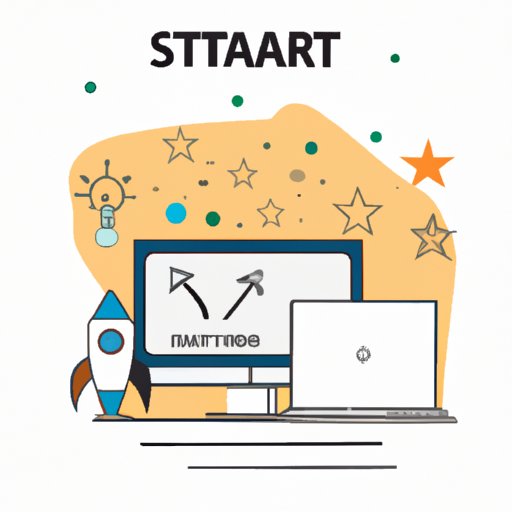Introduction
Starting a business without a degree is possible with the right resources, knowledge, and determination. Although having a college degree can provide certain advantages, there are many other ways to become an entrepreneur and grow your own business. This article will provide an overview of the steps involved in starting a business without a degree.
Research the Market
The first step in starting a business without a degree is researching the market. This involves understanding customers’ needs and analyzing competition. Being aware of the current market trends, opportunities, and challenges can help entrepreneurs make informed decisions about their businesses.
Understanding customers’ needs is crucial for any business. Knowing what products or services customers want and how much they are willing to pay for them can help entrepreneurs create successful businesses. Researching customer preferences and buying habits can also provide insight into how to best meet customers’ needs.
Analyzing competition is important for any business. Knowing who the competitors are and what they offer can help entrepreneurs create unique products or services that stand out from the crowd. Additionally, studying competitors’ pricing strategies can help entrepreneurs determine the most effective pricing for their own products or services.
Create a Plan
Once the market has been researched, the next step is to create a business plan. A business plan should include goals for the business, a description of the products or services offered, and a financial plan. Setting realistic goals and outlining the products or services offered can help entrepreneurs stay focused on their objectives.
Establishing a financial plan is also important. This involves determining the start-up costs, estimating potential profits, and creating a budget. Having a financial plan can help entrepreneurs understand their financial situation and make informed decisions about their businesses.
Secure Financing
Securing financing is another important step in starting a business without a degree. Small business loans and lines of credit are typically available to entrepreneurs without a college degree. Additionally, there are various alternative financing options, such as crowdfunding, angel investors, and venture capital.
When applying for a loan or line of credit, entrepreneurs should be prepared to provide detailed information about their businesses, such as financial statements, business plans, and credit history. Additionally, it is important to shop around to find the best rates and terms.
Network
Networking is an essential part of starting a business without a degree. Connecting with other entrepreneurs can provide valuable resources and advice. Additionally, taking advantage of professional resources, such as business mentors and industry experts, can be beneficial for entrepreneurs.
In addition to networking with other entrepreneurs, it is important to build relationships with potential customers and suppliers. Establishing connections with these individuals can provide invaluable insights into the market and help entrepreneurs develop successful businesses.
Utilize Online Resources
Finally, entrepreneurs should utilize online resources when starting a business without a degree. There are numerous online tools and resources available, such as business planning templates, financial calculators, and marketing ideas. Taking advantage of these resources can help entrepreneurs save time and money.
Conclusion
Starting a business without a degree is possible with the right resources, knowledge, and determination. The steps involved in doing so include researching the market, creating a plan, securing financing, networking, and utilizing online resources. With the right guidance and dedication, entrepreneurs can successfully launch and grow their businesses.
(Note: Is this article not meeting your expectations? Do you have knowledge or insights to share? Unlock new opportunities and expand your reach by joining our authors team. Click Registration to join us and share your expertise with our readers.)
